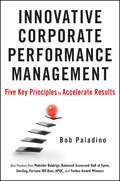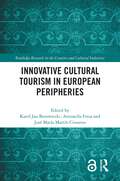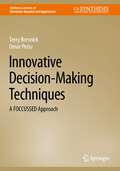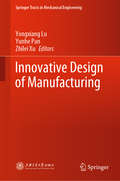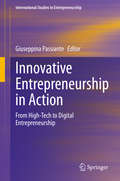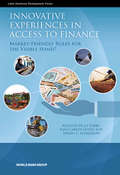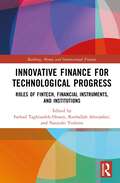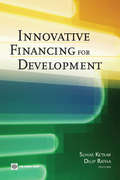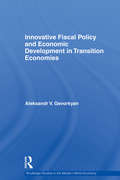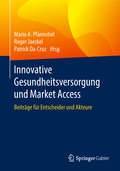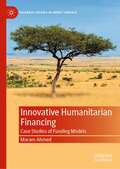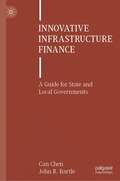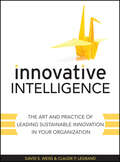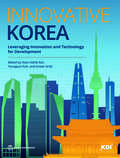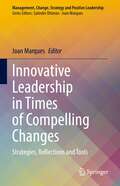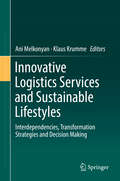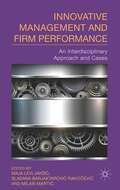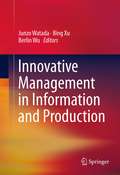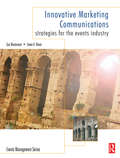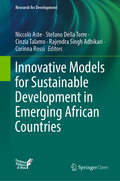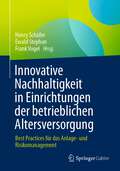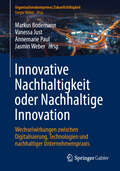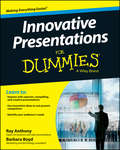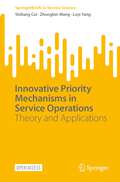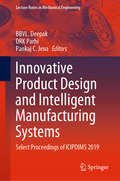- Table View
- List View
Innovative Corporate Performance Management
by Bob PaladinoAward-winning strategies to drive game changing meaningful results during the most challenging economy in decadesDrawing from executive and thought leader Bob Paladino's research and advisory experiences and collaboration with award-winning and high-performing organizations, this sequel his global best seller Innovative Corporate Performance Management: Five Key Principles to Accelerate Results provides a clear road map for executing enterprise strategy.Reveals a proven implementation model that has accelerated breakthrough resultsShares over 40 new, innovative best practices common to Malcolm Baldrige, Balanced Scorecard Hall of Fame, Sterling quality, Fortune 100 Best, APQC, and Forbes award winnersProvides a CPM Process Blueprint and diagnostic to score your organization and establish a plan for your award winning performanceOffers a fresh approach to integrating proven methodologies proven by case companies that have been awarded over 100 awardsIncludes key process maps, strategic planning frameworks, strategy maps, customer and competitor intelligence methods, balanced scorecards, comparative tables, project plans, testimonials, charts, graphs, and screen shots of CPM, CRM, BSC and KM systemsAll-new case studies and best practice research are included from world-renowned enterprises as well as insights from executives who have won the most globally recognized awards in business.
Innovative Cultural Tourism in European Peripheries (Routledge Research in the Creative and Cultural Industries)
by Karol Jan Borowiecki Antonella Fresa Civantos, José María MartínCultural tourism can play an important role in social and territorial cohesion. Focusing on European peripheral regions, this book illuminates the importance of local communities in heritage management for sustainable development.This book provides insights into the use of innovative business models and tools, such as ecosystem services contracts and digital narrative platforms, to enhance the sustainability and economic development of peripheral and marginal destinations. Additionally, this book addresses the value of data collection and analysis in cultural tourism and provides insights into participatory models and approaches that contribute to sustainable tourism development.With contributions from a pan‑European range of expert scholars and practitioners, this book serves as an essential resource for researchers, professionals, and anyone with an interest in tourism, and the cultural and creative industries.The Open Access version of thi book, available at www.taylorfrancis.com, has been made available under a Creative Commons Attribution-Non Commercial- No Derivatives (CC-BY-NC-ND) 4.0 license.
Innovative Decision-Making Techniques: A FOCCUSSED Approach (Synthesis Lectures on Operations Research and Applications)
by Terry Bresnick Omar PeriuThis book provides a blend of quantitative and qualitative approaches to decision making, while also bridging the gap between the theory of how to make good decisions versus how people actually make decisions. The authors present the tools and techniques of decision analysis to learn how to become a FOCCUSSED decision maker: Identify and properly Frame the decision or problem at handSpecify the goals, Objectives, and values that you are trying to achieveDevelop creative, meaningful Choices from among which you can chooseEvaluate the Consequences of selecting each alternative using your goals, objectives, and valuesThink about the key Uncertainties that could impact the decisionUnderstand the Swaps and trade-offs that you are willing to makeDevelop an approach for implementing your SolutionElicit the data you’ll need from a variety of sourcesand Disseminate and communicate your decisions to others. The authors define a decision as the choice among alternatives, based on how we value and trade-off their pros and cons, made in the face of uncertainty about what will actually happen. The decision-making process is presented as having three pillars to support the decision maker: Preferences–what we prefer, what meets our goals and objectives, and the recognition that preferences are personal to the one making the decision; Alternatives–the choices, options, or courses of action that we have, and over which we have some degree of control; and Information–what we know about the situation, what we don’t know, how we connect choices to outcomes, and how we deal with uncertainty. Key components of good decision-making include how to define your goals and objectives, how to incorporate uncertainties that we all face, and how to develop better alternatives, all of which are discussed. Sophisticated techniques are presented in a way that is accessible to the average decision maker. Probability theory is utilized to improve decisions, and uncertainties are captured in decision trees. Risk avoidance, risk transfer, and risk mitigation are also discussed. Readers will gain a clear understanding of how to articulate the goals and objectives that should be the focal point of any decision.
Innovative Design of Manufacturing: Compiled By Project Team Of Research On Strategic Development Of Innovative Design (Springer Tracts in Mechanical Engineering)
by Yongxiang Lu Yunhe Pan Zhilei XuWith the implementation of the strategic plan “Made in China 2025” as its guideline and “the study of formulation of executive summary of innovative design in the manufacturing industry” as the main theme, this book provides an in-depth interpretation of innovative design from three perspectives – why, what and how. Chapter One, “The Necessity of Developing Innovative Design,” focuses on why innovative design should be developed, and Chapter Two, “Concept And Connotation of Innovative Design,” explains what innovative design is, while Chapters Three to Seven systematically and comprehensively discuss how to develop innovative design and how to improve innovative design skills in various contexts, including key industries, business, personnel training, platform building, and supporting measures. Lastly, Chapter Eight “Cases of Innovative Design” explores the value of innovative design and innovative design-driven industrial transformation. By analyzing several design-driven companies, such as China Railway Rolling Stock Corporation, Haier Group and GAG Trumpchi, and the role of corporate innovative development as well as typical examples of major innovative design projects, it offers readers insights and inspiration.
Innovative Entrepreneurship in Action: From High-Tech to Digital Entrepreneurship (International Studies in Entrepreneurship #45)
by Giuseppina PassianteThis book analyses prevailing approaches and policies in innovative entrepreneurship. It explores the ways in which entrepreneurs learn and develop innovation-based businesses to drive increased regional competitiveness. Specifically, the contributions propose that sustainable innovation ecosystems booster innovative entrepreneurship and thus create a competitive advantage for smart and sustainable growth. It also examines the current state of entrepreneurship education, where the development of entrepreneurial abilities is considered a process of value creation—both economic and social—with the final aim to create both new start-ups and entrepreneurial mind-sets.Featuring theoretical approaches and empirical evidences, this title is appropriate for scholars, academics, students and policy makers in technology and innovation management, economics of innovation and entrepreneurship.
Innovative Experiences in Access to Finance: Market-Friendly Roles for the Visible Hand?
by Augusto De la Torre Juan Carlos Gozzi Sergio L. SchumuklerInterest in access to finance and awareness of its importance have increased significantly since the early 2000s. Growing evidence suggests that lack of access to credit prevents many households and firms from financing high-return investment projects, which has an adverse effect on growth and poverty alleviation. Despite the increasing awareness of the importance of access to finance among both researchers and policymakers, there are still some major gaps in our understanding of the main drivers of access, as well as about the impact of different policies in this area. This book aims to fill some of these gaps by discussing recent innovative experiences in broadening access to credit in Latin America. These experiences are consistent with an emerging new view that, while recognizing the central role of the public sector in improving the contractual and informational environment for financial markets, also contends that there might be room for well-designed, restricted interventions in collaboration with the private sector to foster the development of financial markets and broaden access to them. In particular, the book analyzes, among other things, some interesting experiences from Brazil, Chile, Colombia, and Mexico that use different instruments to broaden access to credit in a sustainable way, such as structured finance, factoring, credit guarantees, and correspondent banking. Most of these experiences have led to financial innovation by developing new financial products and coordinating different players in the financial and real sectors to overcome barriers to access to credit. The book provides a first systematic analysis of these innovative experiences, including an analytical framework to understand problems of access to finance and a discussion of the effects and optimal design of public interventions. Finally, the book discusses some open policy questions about the role of the private and public sectors (including state†?owned banks) in broadening access to finance in a sustainable and market-friendly manner.
Innovative Finance for Technological Progress: Roles of Fintech, Financial Instruments, and Institutions (Banking, Money and International Finance)
by Naoyuki Yoshino Farhad Taghizadeh-Hesary Roohallah AboojafariInnovative businesses and startups contribute to job creation, economic growth, and technological advancement in most countries. Finance helps nurture innovative firms like startups. Unfortunately, most startups and innovative projects cannot secure finance through the usual and conventional methods. This book goes beyond traditional financing to explore innovative ways to help finance startups and novel businesses. The book covers institutional innovation, innovation in products and processes, and the recent progress in financial innovations in various countries through empirical and case studies. It gives an in-depth look at regulatory, policy frameworks, and risk assessments for financial innovations. It also assesses the role of various innovations, including Fintech, machine learning, big data, scoring models, credit databases, digital platforms, credit guarantees in funding startups, and novel technologies. This book offers valuable insights into how policymakers can nurture a more conducive ecosystem for startups and technologies through innovative finance.
Innovative Financing for Development
by Dilip Ratha Suhas KetkarDeveloping countries need additional, cross-border capital channeled into their private sectors to generate employment and growth, reduce poverty, and meet the other Millennium Development Goals. Innovative financing mechanisms are necessary to make this happen. 'Innovative Financing for Development' is the first book on this subject that uses a market-based approach. It compiles pioneering methods of raising development finance including securitization of future flow receivables, diaspora bonds, and GDP-indexed bonds. It also highlights the role of shadow sovereign ratings in facilitating access to international capital markets. It argues that poor countries, especially those in Sub-Saharan Africa, can potentially raise tens of billions of dollars annually through these instruments. The chapters in the book focus on the structures of the various innovative financing mechanisms, their track records and potential for tapping international capital markets, the constraints limiting their use, and policy measures that governments and international institutions can implement to alleviate these constraints.
Innovative Fiscal Policy and Economic Development in Transition Economies (Routledge Studies In The Modern World Economy Ser. #88)
by Aleksandr V GevorkyanThis book explores the problems of fiscal policy as an instrument of economic and social development in the modern environment, primarily focusing on the transition economies of Eastern Europe, Caucasus, and Central Asia. Evaluating the transformational experience in these countries, this work meets a need for a critical analysis in the aftermath of the 1990s market liberalization reforms, of current trends and to outline the roadmap for future development.
Innovative Gesundheitsversorgung und Market Access: Beiträge Für Entscheider Und Akteure
by Mario A. Pfannstiel Patrick Da-Cruz Roger JaeckelDieses Fachbuch beschäftigt sich mit innovativen Gesundheitsversorgungsangeboten und dem Markzugang von Produkten und Dienstleistungen im Gesundheitswesen. Die Autoren behandeln das Thema aus unterschiedlichen Perspektiven. Die Themenschwerpunkte werden durch die sieben nachfolgenden Perspektiven gebildet: Politik und Institutionen, innovative Arzneimittelversorgung und AMNOG, innovative Medizinprodukteversorgung, Vergütung innovativer Gesundheitsleistungen, neue Therapie- und Versorgungsformen und Digital Health. Der Sammelband richtet sich einerseits an Wissenschaftler und Studierende mit den Schwerpunktfächern Gesundheitsökonomie bzw. -politik, Gesundheitsmanagement, Marketing und andererseits an Praktiker und Berater im Gesundheitsmarkt, wie z.B. Geschäftsführer, Verbandsvertreter und gesundheitspolitisch verantwortliche Entscheidungsträger.
Innovative Humanitarian Financing: Case Studies of Funding Models (Palgrave Studies in Impact Finance)
by Maram AhmedHumanitarian crises have become more frequent, complex and protracted. If current trends continue, it is estimated that by 2030, humanitarian assistance costs could increase to $50 billion per year. By then, two-thirds of the world’s poor are at risk of living in conflict-affected countries. To bridge the gap, humanitarian organizations are increasingly utilizing innovative financing tools such as impact bonds, faith-based finance and other innovative financial products and services to mobilize greater funding to address humanitarian needs. This book is among the first to assess a set of innovative financing mechanisms that have been transforming the humanitarian sector and explores their key opportunities, challenges and future prospects. This book will be of interest to academics, practitioners, humanitarian organizations and policy makers involved in humanitarian financing and to the humanitarian sector in general.
Innovative Infrastructure Finance: A Guide for State and Local Governments
by Can Chen John R. BartleInfrastructure is the foundation of modern economies. A robust, efficient, and well-maintained infrastructure system is critical to support the nation’s economy, improve quality of life, and strengthen global competitiveness. The serious infrastructure deficit in the U.S. is well-known. State and local governments are struggling to finance the needed expansion, upgrades, and repairs. Meeting the infrastructure financing challenge has emerged as one of the most urgent issues facing the country. Despite the growing number of innovations in state and local infrastructure financing, current information on innovative infrastructure financing is scattered and time-consuming to find. Until now, there was no detailed, comprehensive assessment of current knowledge and practice in innovative infrastructure financing. This book fills that gap and offers policy suggestions for state and local government managers who are considering the adoption and implementation of innovative infrastructure financing. It provides detailed case studies and rich examples that describe innovative approaches to fund state and local infrastructure development. These experiences and lessons in applying these innovations will be particularly useful for state and local government practitioners, professors, applied policy analysts, and students in public administration, policy, and public finance.
Innovative Intelligence: The Art and Practice of Leading Sustainable Innovation in Your Organization
by David S. Weiss Claude LegrandInnovation is a key source of competitive advantage, but it remains frustratingly elusive for many organizations. This book shows you how to close the innovation gap by making individuals and organizations systematically and sustainably innovative. You will learn how to embrace a culture of innovation and make it permeate every level of the organization. You will find a clear road map and practical tools to redefine your workplace's culture, identify and tap into the existing innovative intelligence, and develop leaders who can close the innovation gap for greater business success.
Innovative Korea: Leveraging Innovation and Technology for Development
by Hoon Sahib Soh, Youngsun Koh, and Anwar AridiThe Republic of Korea today is a highly industrialized, global leader in innovation and technology. It is the 10th largest economy in the world and has a per capita income approaching the average of OECD countries. In the 1950s, however, it was one of the world’s poorest countries, with decidedly bleak prospects. Its transformation has made Korea a well-known case study of successful development. Innovative Korea: Leveraging Innovation and Technology for Development summarizes the sources of Korea’s remarkable growth and the policies and institutional reforms that made it possible. The report focuses on Korea’s successful transition from a middle-income to a high-income economy. Korea escaped from the “middle-income trap†? by fundamentally transforming its growth paradigm to a more private-sector-led model emphasizing market competition, innovation, and technology. Compared to the previous emphasis on large fi rms and industries, the government became more focused on promoting small and medium enterprises and technology entrepreneurs. Exports expanded significantly through greater integration in global value chains. Already-high levels of human capital development were complemented by an expanded social safety net and a more integrated approach to education and training. Korea succeeded by focusing on the foundations of long-run growth, building global capabilities in innovation and technology, and adapting and evolving its growth paradigm to promote new sources of growth. Innovative Korea, jointly prepared by the World Bank and the Korea Development Institute, provides useful insights on Korea’s development story and practical lessons for public policy making.
Innovative Leadership in Times of Compelling Changes: Strategies, Reflections and Tools (Management, Change, Strategy and Positive Leadership)
by Joan MarquesThis book focuses on the need of leaders in professional and personal realms to understand the importance of innovative thinking to safeguard sustainability and enhance satisfaction and motivation among stakeholders in organizations. It provides professionals with a set of reflective stances, cautionary points, and roadmaps that enable them to do the right thing. From crisis management to spiritual practices, and from pro-social concepts to social responsibility and sustainability: the common denominator is a collective and concerted effort to develop leadership behaviors and strategies to safeguard generations to come.
Innovative Logistics Services and Sustainable Lifestyles: Interdependencies, Transformation Strategies and Decision Making
by Ani Melkonyan Klaus KrummeThis edited volume aims to describe the transformation of supply chain management (SCM) and logistics services by merging sustainable logistics, SCM, sustainable consumption and lifestyle research. This assessment of the transformation potential serves the development of sustainable business models and optimized decision-making systems for achieving sustainable economic value creation within a green economy. In 5 sections, the volume takes a unique transdisciplinary approach to assess sustainable business practices within SCM and the logistics sector, and to understand the interactions between logistics services and consumer lifestyles while creating transparency within the decision making process. This book will be of particular interest to academics, policymakers, planners, and politicians. Section 1 introduces readers to the importance of blended research and innovation between sustainable SCM and consumer lifestyles for transformation towards a green economy. Section 2 addresses the question of how trends and developments in consumption behavior and lifestyles influence the development of sustainable logistics. Section 3 discusses the transformation potential towards sustainable logistics using the food sector as an example. Section 4 focuses on strategic decision making in SCM, and how long-term improvements of sustainability performance can be achieved. Section 5 concludes with policy recommendations as well as research and innovation perspectives for future sustainable development with SCM and logistics.
Innovative Management And Firm Performance
by Maja Levi Jakšić Slađana Barjaktarović Rakočević Milan MartićThis book focuses on business firms as catalysts and agents of social and economic change, and explores the argument that sustainable development is the perfect opportunity for businesses to strengthen the evolving notion of corporate social responsibility, while achieving long-term growth through innovation, research and development.
Innovative Management in Information and Production
by Junzo Watada Bing Xu Berlin WuInnovative Management in Information and Production is based on the proceedings of the Third International Symposium on Innovative Management, Information and Production. This symposium is held by International Society of Management Engineers. The symposium took place on October 8-10, in HCMC, Vietnam. This book examines recent innovative management of information and productions such as digital collection management and operations planning, scheduling and control.
Innovative Marketing Communications: Strategies For The Events Industry (Events Management)
by Emma Wood Guy MastermanInnovative Marketing Communications for Events Management provides students and event managers with a complete insight into the strategic and innovative marketing of events of all scales and nature. The book builds a conceptual framework for the development, planning, implementation and evaluation of innovative communication strategies for the marketing of events, and the effective use of events as an innovative communications method in general organizational marketing.With a strong practical underpinning, Innovative Marketing Communications for Events Management emphasises to event managers the importance of effectively integrating a range of tools and techniques to communicate the event and provides them with a better understanding of how a variety of private and public sector organisations can use events within their communication strategies.
Innovative Models for Sustainable Development in Emerging African Countries (Research for Development)
by Corinna Rossi Cinzia Talamo Stefano Della Torre Niccolò Aste Rajendra Singh AdhikariThis open access book explores key issues and presents recent case studies in areas of importance for the transition to a circular model of development in emerging African countries that will minimize resource consumption and waste production. The topics covered include the development of sustainable housing models, energy and environmental issues in building design and technical systems, recycling for a sustainable future, models for humanitarian emergencies, and low-cost and web-based digital tools with applications in architecture and archaeology. The aim is to contribute to a necessary paradigm shift with respect to urban planning and usage of territories, moving from a linear urban metabolism based on the “take, make, dispose” approach to a circular metabolism. Such a change requires a focus on the relationship between the architectural, urban, and physical aspects of new developments, climate, and energy demand, as well as the identification and integration of strategies and infrastructures to achieve a high level of efficiency and self-sufficiency. The book will appeal to all with an interest in sustainable development in the African context.
Innovative Nachhaltigkeit in Einrichtungen der betrieblichen Altersversorgung: Best Practices für das Anlage- und Risikomanagement
by Henry Schäfer Frank Vogel Ewald StephanDas Buch bietet Einblicke in die Vielfalt der Umsetzungswege nachhaltiger Kapitalanlagen in Einrichtungen der betrieblichen Altersvorsorge in Deutschland, der Schweiz und Österreich. Während der erste Teil des Buches übergreifenden Themenbeiträgen zu nachhaltigen Kapitalanlagen gewidmet ist, möchte der zweite Teil Altersvorsorgeeinrichtungen dazu anregen, eigene Praktiken und Strategien zu nachhaltigen Kapitalanlagen zu reflektieren und zu bereichern. Für die verschiedenen Dienstleister im Bereich der betrieblichen Altersvorsorge liefern die Themenbeiträge wichtige Einblicke in die Praxis nachhaltiger Kapitalanlagen in einem für institutionelle Investoren stetig an Bedeutung wachsenden Segment.
Innovative Nachhaltigkeit oder Nachhaltige Innovation: Wechselwirkungen zwischen Digitalisierung, Technologien und nachhaltiger Unternehmenspraxis (Organisationskompetenz Zukunftsfähigkeit)
by Markus Bodemann Vanessa Just Jasmin Weber Annemarie PaulInnovation und Nachhaltigkeit – lediglich zwei Buzzwords oder eine Symbiose? Digitalisierung und die Nutzung neuer Technologien wie Künstliche Intelligenz bieten Chancen für innovative Geschäftsmodelle sowie neuartige Produkte und Dienstleistungen. Während neue technologiegetriebene Potentiale realisiert werden, stellt sich zunehmend die Frage nach der Nachhaltigkeit von Innovationen. Welche sozialen, ökologischen und wirtschaftlichen Implikationen bringen sie mit sich? Wie wirken Innovation und Nachhaltigkeit zusammen und gibt es ein gegenseitiges Treiben? Dieses Buch beleuchtet die Interdependenz von Innovation und Nachhaltigkeit in ihrer Vielfalt. Dabei werden Anwendungsszenarien und Implikationen aus verschiedenen Branchen und Industrien erläutert und unmittelbare und mittelbare Einflüsse von Innovation auf die Gesellschaft, Unternehmen und Politik diskutiert. Das Werk richtet sich an Entscheider in Unternehmen, Studierende, Dozierende und alle, die sich ein Bild über die vielfältigen Implikationen und Zusammenhänge von zukunftsweisenden Innovationen und Technologien und damit verbundene Nachhaltigkeitsaspekte machen wollen.
Innovative Presentations For Dummies
by Barbara Boyd Ray AnthonyBe the speaker they follow with breakthrough innovative presentationsInnovative Presentations For Dummies is a practical guide to engaging your audience with superior, creative, and ultra-compelling presentations. Using clear language and a concise style, this book goes way beyond PowerPoint to enable you to reimagine, reinvent, and remake your presentations. Learn how to stimulate, capture, and hold your audience in the palm of your hand with sound, sight, and touch, and get up to speed on the latest presentation design methods that make you a speaker who gets audiences committed and acting upon your requests. This resource delves into desktop publishing skills, online presentations, analyzing your audience, and delivers fresh, new tips, tricks, and techniques that help you present with confidence and raw power.Focused and innovative presentations are an essential part of doing business, and most importantly, getting business. Competition, technology, and the ever-tightening economy have made out-presenting your competitors more important than ever. Globally, an estimated 350 PowerPoint presentations are given every second. When it's your turn, you need to go high above and far beyond to stand out from the pack, and Innovative Presentations For Dummies provides a winning game plan. The book includes extensive advice on the visual aspect of presentations and, more importantly, it teaches you how to analyze your audience and speak directly to them. A personalized approach combined with stunning visuals and full sensory engagement makes for a winning presentation.Learn how to be an innovative, not just "effective" presenter in any situationUnderstand how to read and cater to specific audiencesCreate captivating visual materials using technology and propsCreative customize presentations to best communicate with audiencesMore and more employees are being called upon to make presentations, with or without prior training. With step-by-step instruction, vivid examples and ideas and a 360-degree approach to presentations, Innovative Presentations For Dummies will help to drastically improve your presentation outcomes as never before.
Innovative Priority Mechanisms in Service Operations: Theory and Applications (SpringerBriefs in Service Science)
by Shiliang Cui Zhongbin Wang Luyi YangThis book introduces the most advanced and recent theoretical research on innovative priority mechanisms in service settings. It covers cutting-edge topics on service innovations such as line-sitting, service-position-trading, referral priority programs, queue-scalping, distance-based priority, and dynamic priority policy. It also contains a variety of practical examples and applications which help managers to make better decisions and to develop a coherent business strategy.This book appeals to a wide readership, from academics and Ph.D. students who are interested in priority mechanisms, to service managers and researchers in the service industry.This is an open access book.
Innovative Product Design and Intelligent Manufacturing Systems: Select Proceedings of ICIPDIMS 2019 (Lecture Notes in Mechanical Engineering)
by Bbvl. Deepak Drk Parhi Pankaj C. JenaThis book gathers selected research articles from the International Conference on Innovative Product Design and Intelligent Manufacturing System (ICIPDIMS 2019), held at the National Institute of Technology, Rourkela, India. The book discusses latest methods and advanced tools from different areas of design and manufacturing technology. The main topics covered include design methodologies, industry 4.0, smart manufacturing, and advances in robotics among others. The contents of this book are useful for academics as well as professionals working in industrial design, mechatronics, robotics, and automation.
